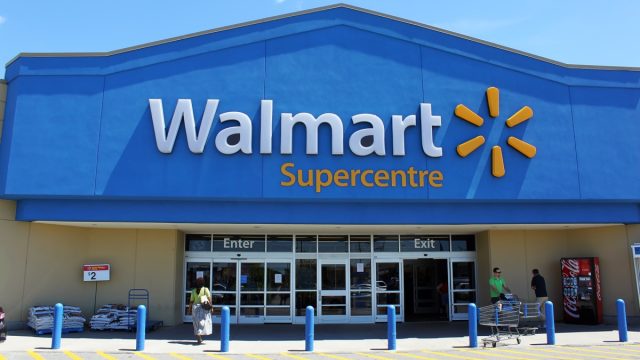Walmart Is Banned From Selling This One Thing in Texas

You can go to Walmart for anything and everything, from your weekly groceries to your DIY needs. But if you’re a Texan, you know there’s one thing you can’t buy at Walmart: liquor. The world’s largest retailer has been attempting to prove that a 1995 state law that bars the sale of liquor by publicly owned companies in Texas is discriminating against out-of-state commerce. But following the U.S. Supreme Court rejecting Walmart’s petition this week, the company has failed in its bid to start selling liquor at its stores in Texas. Read on for the details, and for another Walmart update, check out If You Bought This at Walmart, Throw It Away Now.
Walmart argued that the law excludes any non-Texan from the market, thus violating the Constitution, specifically the Commerce Clause and the 14th Amendment that guarantees equal protection under the law. The company pointed out that 98 percent of liquor stores in the Lone Star State are owned wholly by Texans, and the ban “operates to block anyone in a position to compete with Texans in the retail liquor market from doing so,” The Texas Tribune reports.
The roots of the law lie in attempts to curb levels of hard alcohol consumption. By excluding large corporations from the market, they are unable to use their economies of scale and greater buying power to undercut competitors and sell alcohol more widely and at a lower price point. “This approach has served Texas well—it has consistently ranked among the states with the lowest per capita liquor consumption,” Texas Attorney General Ken Paxton argued, according to Bloomberg.
The law was struck down in 2018 by U.S. District Judge Robert Pitman as being unconstitutional, but in this latest round, 5th U.S. Circuit Court of Appeals said Walmart had to present a stronger case that they were suffering discrimination. Texas is now the only state that does not let publicly traded companies sell liquor (although beer and wine sales are permitted). So for now at least, Texans wanting a drop of the hard stuff will need to keep shopping elsewhere.
To see the items disappearing from Walmart shelves as of late due to COVID, read on, and for another development from the retail giant, check out Walmart Is Now Doing This as Soon as You Go in the Store.
1
Toilet paper

On a Nov. 17 earnings call with investors, Walmart CEO Doug McMillon and Walmart U.S. CEO John Furner said the company’s supply chain was “still stressed” in certain areas of the country, according to CNBC. “The specific categories where we have the most strain at the present time would be bath tissue and cleaning supplies,” Furner said on the call. And for more on why toilet paper may be hard to come by, check out These Two Toilet Paper Companies Just Filed For Bankruptcy.
2
Cleaning products

This was the other type of product Furner said was disappearing off shelves. Market research firm IRI reports that 15 percent of household cleaning products were out of stock the week ending Nov. 22, up from the usual figure of around 5 percent.
3
Paper towels

Some chains—including Kroger and Giant—have limited the amount of paper towels, toilet paper, and disinfecting products that shoppers can buy at once. Walmart has not implemented any storewide purchase limits on key items, but individual managers do have the power to “implement item limits based on their specific store experience to help sustain product availability,” Delia Garcia, a spokesperson for Walmart, wrote in an email to CNN.
IRI reports that around 20 percent of paper products were out of stock during the week ending Nov. 22, also up from the usual 5 percent. And for more regular updates on Walmart and other stores you shop at, sign up for our daily newsletter.
4
Dry foods

On the call last week, McMillon said he was disappointed to see “as many out-of-stocks as we have in consumables right now generally,” highlighting dry goods specifically. But he said the situation is still not as bad as it was in March and April. And for another major change at the retail giant, check out You’ll Never See These in Walmart Again After a Failed 3-Year Experiment.